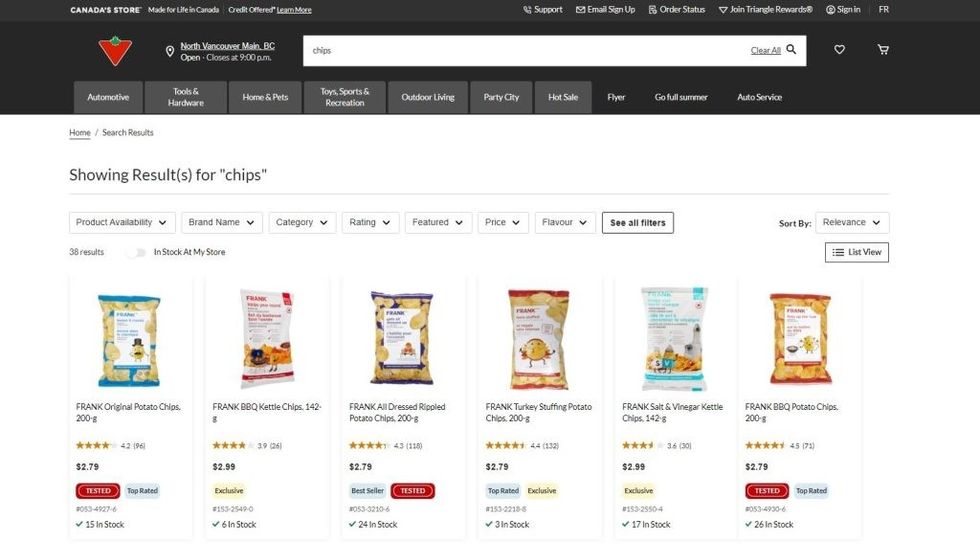What is it about Canada that has given American retailers trouble?
In March, Seattle-based Nordstrom announced that it was closing all 13 of its stores in Canada.
In February, New Jersey-based Bed, Bath & Beyond announced that its 54 stores in Canada were heading to, well, the Great Beyond.
In November, North Carolina-based Lowe's announced that it was selling all 450 of its Canadian stores.
In 2017, Chicago-based Sears filed for creditor protection and subsequently shuttered all 140 of its various-sized stores in Canada.
Also in 2017, Ohio-based Express filed for creditor protection, closing all 17 of its stores in Canada in the process.
In 2015, Minnesota-based Target famously flamed out and closed all 133 of its stores in Canada, after taking over the spaces formerly occupied by Zellers (which has since been brought back to life).
In 1998, well before the so-called "retail apocalypse," Illinois-based Kmart sold all 112 of its stores in Canada to the Hudson's Bay Company.
"There's always been American retailers coming into Canada," says CoStar Group's Canadian Chief Economist and Head of Market Analytics Carl Gomez. "Some have been successful, like Walmart, and other ones have not."
Product Mix
Target has easily been the highest-profile example of American retailers failing to take off in Canada, and there were a couple reasons why, Gomez says.
"Target did very well amongst Canadians. Prior to them arriving in Canada, Canadians would drive down to the States and go to Target all the time. It had a perfect allure, kind of upscale discount, so it fit the Canadian spending profile. The problem with them [in Canada] was that their merchandising mix didn't look all that great. A lot of people used to say back then that they seemed to just be a glorified Zellers, and their product mix wasn't quite the same as what you got in the US."
Gomez adds that even when the product mix was good, there were a lot of empty shelves as a result of challenges Target faced regarding their supply chain management system, which he believes to be the real issue at the heart of the problems American retailers have faced in Canada.

Economies of Scale
Canada is a very large country, geographically, and the cost of shipping is expensive, Gomez says.
"We don't have economies of scale like the US does, and without those, you can run into inventory blockages. Supply chains are all about shortening the chain, just-in-time inventory, and Target misfired in terms of being able to figure out that problem."
Gomez says the economies of scale problem is not something that has only ailed Target, pointing to the fact that Amazon has hourly shipping in the US, but not yet in Canada, where even same-day shipping is not always exactly same-day.
"The analogy I always use is if you want to ship something from New York to San Francisco, it costs you $10, as a shipper. If you want to ship something from Toronto to Vancouver, it's going to cost you over $50. It's that much more expensive."
This is a problem the entire retail industry in Canada faces, Gomez says, and it's a reason why our retail prices are higher, even after factoring in exchange rates.
"It's not sexy. It's logistics. The sexier reason is that consumers in Canada are completely different than they are in the US, especially on the high end. Canadians have lower incomes, on average, than Americans do. Luxury here is not like luxury in the US. A high-end consumer would wear a Chanel belt with gold on it in the US, but Canadians are much more frugal, so you're dealing with a smaller pot, which I think was the issue for Nordstom more than anything else."
Gomez also notes that the Canadian retail market is quite nuanced, and that what happens in Vancouver is not necessarily what happens in Toronto, and even what happens in Toronto in terms of spending patterns can vary from Rosedale to Scarborough, for example.
"Canadian identity is another big factor," Gomez said. "There is brand loyalty to companies like Canadian Tire, where you can now get food and clothing. It's not just tires and sports equipment anymore. That's Canada for you."

Counting the Costs
Another issue Gomez believes to have given American retailers in Canada trouble is as it relates to labour.
"In many US markets, you can have people make a career out of retail jobs. Somebody who works at Target could work there forever, so you're not going to have a labour supply issue," he says. "The reason why is because a $20,000 to $30,000 a year retail job in the US can still allow you to afford a home in some places in the US. Affordability is not the issue that it is here in Canada, where retail jobs are primarily those marginally attached to the labourforce, such as recent immigrants and students, and we see a higher turnover for labour here."
Interestingly enough, one factor that's easier for American retailers in Canada is the real estate.
"In the US, when you look at the overall sq. ft per capita -- the amount of retail space per person -- there's far more in the US, almost double the amount that there is in Canada, which means that for an American consumer, there's a lot more places for them to shop, and a lot more opportunity for it to go dead. That's why the concept of 'dead malls' is very much a US phenomenon."
Conversely, then, American retailers face a lower number of competitors in Canada and have room to succeed, if they can get figure out the aforementioned challenges.
Once Bitten, Twice Shy?
Asked whether he thinks some of the American retailers who have left Canada would ever try again, Gomez says he doesn't see it happening.
"If I was running their company, it's 'once bitten, twice shy,' right? Why would you do that again? Quite frankly, it may not be something that adds to any profitability on their end," he said. "One of the ways to increase profitability is by opening up to new markets, but because Canada is so small [of a market], the marginal impact of profitability is probably not worth the time or cost."
"I highly doubt that they would ever come back."




















